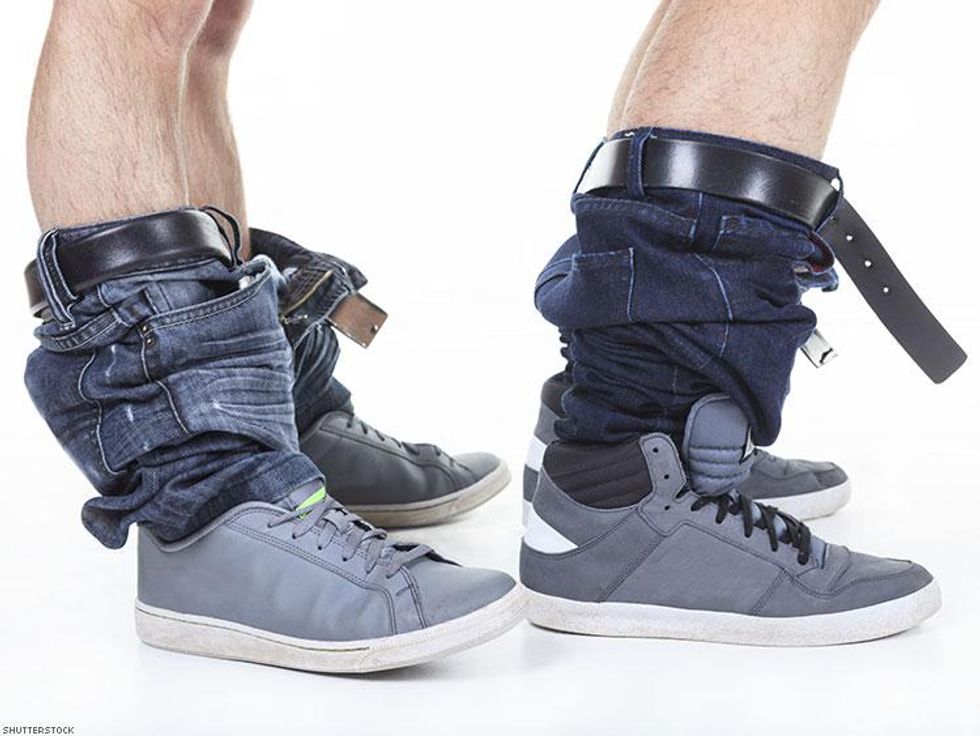
Treatment GuideJust DiagnosedSex & DatingAfrican AmericanStigmaAsk the HIV DocPrEP En EspañolNewsVoicesPrint IssueVideoOut 100
CONTACTCAREER OPPORTUNITIESADVERTISE WITH USPRIVACY POLICYPRIVACY PREFERENCESTERMS OF USELEGAL NOTICE
© 2026 Pride Publishing Inc.
All Rights reserved
All Rights reserved
By continuing to use our site, you agree to our Privacy Policy and Terms of Use.
There is a glaring absence of comprehensive sex education in the United States, and when it comes to same-sex relations (and certain sex acts like oral and anal sex even between heterosexual partners), the curriculum is non-existent.
This is a problem, particularly for young gay and bisexual men, ages 13-24, whose rates of HIV-infection are up by a shocking 132.5 percent. Recent studies found that teens who get comprehensive sex education make better choices about sex.
So, get out a pen and crack those notebooks, it’s time to take some notes. I promise you'll enjoy testing out your new knowledge.
Anal Sex 101
When it comes to anal sex, there are three basic elements you should focus on: consent, cleanliness, and comfort.
Consent: Consent isn't discussed nearly as often as it should be, but it's a integral part of sexual (and emotional) health. The duality of men-being-men and same-sex intimacy can blur the lines between a hot power-dynamic and sexual abuse. And if you or your partner say "No," that may be pretty clear; but what if one of you just doesn't say "Yes?" That's where things get more complicated. If you or your partner is inebriated, not being able to say "no" isn't a "yes." You both need to be clear-headed enough to make a real choice. Don't pressure someone else or compromise your own emotional and sexual health by being pressured into doing things you aren’t entirely comfortable with just because you are too afraid to speak up. Use the power of consent and make sure your sexual partners feel comfortable using theirs.
Cleanliness: Anal sex can be great, but the last thing you want is to ruin your sexy moment with an unappealing smell. Sometimes, all you need is a little extra push and some sanitary wipes to be sex-ready. Other times — depending on your diet or your digestive system — you may need to douche. (Douching, however, can damage the mucus membranes on the anal wall — which can increase the risk of gettting sexually transmitted infections, so do be careful.)
Comfort: Lube is one of the most important aspects of sexual health. Lube not only makes sex feel better, but it can also reduce your risk of tearing the anal wall. Lube makes for cleaner, safer, and more pleasurable sex for both partners. So when in doubt, always opt for more lube. There are two general types of lube to choose from.
Water-based lube: This type of lube is easy to clean and safe to use with toys as well as during anal sex. This kind of lube rinses off with water and is 100 percent latex condom compatible. However, water-based lube is not as long lasting as silicone-based lube. Being water-based means it can dry out or absorb into the body, and it isn't waterproof.
Silicone-based lube: This type of lube is smooth, long lasting, and less likely to feel sticky or tacky during use. Since this lube doesn’t absorb into the body, a little goes a long way. It's also waterproof so it works in the shower, bathtub, pool, or jacuzzi. The trade off is that silicone-based lube isn't compatible with silicone-based sex toys. It's also not as easy to clean: you'll need soap and water.
HIV 101
HIV isn’t just a gay issue, but HIV has become entrenched in gay history, gay culture, and gay sex. HIV is now a very manageable disease with the correct treatment, but it can still cause mental, emotional, and physical trauma — especially without proper information and support. With HIV infections on the rise among young gay and bisexual men, it is imperative to arm yourself with the right information in order to stay safe and enjoy your sex life without fear.
Transmission: HIV is transmitted through certain body fluids — blood, semen (cum), pre-seminal fluid (pre-cum), rectal fluids, vaginal fluids and breast milk. HIV does not live in saliva. The most high-risk sexual behavior among gay men is anal sex, with the receptive (bottom) partner at higher risk than the insertive (top) partner. Anal sex, especially sex without lube, can damage tissues in the anal mucous membrane lining of the anal wall. When HIV infected seminal fluid or pre-seminal fluid comes into contact with damaged tissue, transmission can occur. Although most types of oral sex carry little to no risk, if a person has open sores inside their mouth and their HIV-positive sexual partner ejaculates in their mouth, transmission is possible.
Protection: If you have fears that anal sex will result in you becoming HIV positive, you can relax. The good news is, you are free to enjoy sex without ever having to worry about being diagnosed with HIV, so long as you use protection. You have a variety of option available; just find a method that works for you.
Condoms: The golden standard of safer sex, condoms are highly effective at preventing HIV when used correctly. Condoms are a simple and easy protection method that will keep you and your partner safe. And they can work on demand.
PrEP: Truvada, the HIV prevention pill known as pre-exposure prophylaxis (PrEP) is 99 percent effective at preventing HIV transmission when used correctly. According to recent reports, the vast majority of gay men do not wear condoms 100 percent of the time. PrEP is an excellent tool to keep you safe if you and your partner do not use a condom for whatever reason. A prescription for PrEP does require regular doctor’s visits, which include routine lab work. PrEP does not prevent against other STIs. As a "pre-exposure" medication, you have to take PrEP in advance, but it can empower you to take control of your sex life and sexual health.
PEP: This prevention method, known as post-exposure prophylaxis, is meant for use only when you or your sexual partner believe you've been exposed to HIV with risk of transmission. This is not an active prevention strategy, but a reactive response that is available to you if you need it.
TasP:– Treatment as prevention, known as TasP, is when an HIV-positive person is on antiretroviral treatment and achieves an undetectable viral load. When you reaches an undetectable status, you reduce your risk of transmission by 96 percent. To date, there have been zero confirmed cases of HIV transmission by an undetectable person.
Disclosure - The single most important subject to master when it comes to your sexual health is disclosure. Everyone has an HIV status, and an HIV-negative person has just as much of a responsibility to disclose his or her status as an HIV-positive person. Always inquire about your partner’s HIV status, but never assume that he or she is HIV-negative or undetectable just because they say so. People who have HIV but are unaware of their HIV-positive status or have yet to begin treatment account for 91 percent of those newly infected in the U.S.. Unless they have just been tested and have not been with anyone since, you cannot be sure just by taking their word. By disclosing, however, you open the conversation about HIV and STIs between you and your partner. These conversations are vital to establishing trust and fostering healthy communication with your sexual partner.
Testing: There are more than just two HIV statuses. There's HIV-negative, HIV-positive, HIV-positive and undetectable, and HIV unaware. If you've had even one unprotected sexual encounter since your last HIV test, then you are HIV unaware. And the same goes for your partner. By getting tested regularly and using the prevention methods that work for you, you can always be sure what your HIV-status is. For a list of free testing locations in your area, use the AIDS.gov test locator here.
Worry Free Sex – When you disclose your own status and take precautions to protect yourself from transmission, your sex life will be amazing because you have the knowledge that you are protected, no matter what. With this information, you can have sex with, date, or even marry the person who’s right for you, regardless of his or her status.
From our Sponsors
Most Popular
“So much life to live”: Eric Nieves on thriving with HIV
September 03 2025 11:37 AM
It’s National PrEP Day! Learn the latest about HIV prevention
October 10 2025 9:00 AM
Amazing People of 2025: Javier Muñoz
October 17 2025 7:35 PM
“I am the steward of my ship”: John Gibson rewrites his HIV narrative
September 16 2025 2:56 PM
Plus: Featured Video
Latest Stories
HIV-positive men stage 'Kiss-In' protest at U.S.-Mexico border
December 01 2025 12:56 PM
What the AIDS crisis stole from Black gay men
December 01 2025 6:00 AM
The Talk: Owning your voice
August 25 2025 8:16 PM
The lab coat just got queer
August 21 2025 10:00 AM
Messenger RNA could be the key to an HIV vaccine — but government cuts pose a threat
August 20 2025 8:02 AM
The Talk: Beyond the exam room
August 13 2025 3:15 PM
The Talk: Navigating your treatment
August 01 2025 6:02 PM
The Talk: Starting the conversation
July 25 2025 4:47 PM
Thanks to U=U, HIV-positive people can live long, happy, healthy lives
July 25 2025 2:37 PM
How the Black AIDS Institute continues to fill in the gaps
July 25 2025 1:06 PM
“I felt like a butterfly”: Niko Flowers on reclaiming life with HIV
July 23 2025 12:22 PM
Dancer. Healer. Survivor. DéShaun Armbrister is all of the above
July 02 2025 8:23 PM
BREAKING: Supreme Court rules to save free access to preventive care, including PrEP
June 27 2025 10:32 AM
1985: the year the AIDS crisis finally broke through the silence
June 26 2025 11:24 AM
VIDEO: A man living with HIV discusses his journey to fatherhood
June 10 2025 4:58 PM
Trump admin guts $258 million in funding for HIV vaccine research
June 03 2025 3:47 PM



































































